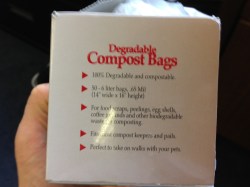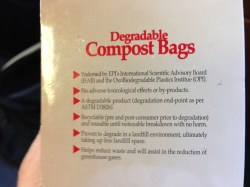 Recently, our dog chewed up our 10-years-old family compost bin. The new, metal bin we purchased came with “degradable” (e.g., not “BIOdegradable”) bags by a company called Norpro. The Norpro bags claim to be safe to throw into your compost pile, where they degrade. But degrade into what exactly? Won’t the bag simply break down into small plastic particles that then contaminate the compost, which in turn we use to fertilize the vegetables we eventually eat? Or are we missing something here?
Recently, our dog chewed up our 10-years-old family compost bin. The new, metal bin we purchased came with “degradable” (e.g., not “BIOdegradable”) bags by a company called Norpro. The Norpro bags claim to be safe to throw into your compost pile, where they degrade. But degrade into what exactly? Won’t the bag simply break down into small plastic particles that then contaminate the compost, which in turn we use to fertilize the vegetables we eventually eat? Or are we missing something here?
So, we contacted Norpro to see what we could find out. First, we called the company’s customer service line (877-879-1360), and were told that we needed to contact their corporate number (800-722-0202). We called them at that number and asked the same question. We were told that they weren’t able to answer the question, and that we should email their sales department.
Before we did that, we checked Norpro’s website, where the company presents its bags as being “[m]ade of 100% degradable and compostable material” and “[e]ndorsed by ISAB and OPI” (note: there’s no indication on the Norpro website what ISAB and OPI might be, exactly). We then emailed the company, told them our understanding is that degradable plastics are still petroleum based, and asked whether these plastics wouldn’t still pollute the environment and potentially harm our health, especially if used for composting purposes?
In response, we received a page of information on Norpro’s degradable compost bags. Among the claims made on this sheet were a couple that seemed dubious:
- “Degradable plastics break down into harmless materials, while biodegradable plastics can leave traces of toxins.”
- “Degradable products are made from oil (which is why they do not leave toxins) but biodegradable products are made from plant or animal sources (which can leave traces of toxins….e.g. – from human or animal waste which can contain all sorts of toxins such as heavy metals and pesticides depending on the person/ animal’s diet).”

We were skeptical about these claims, so Scaling Green editor Lowell Feld checked with an expert on degradable plastics at the U.S. Environmental Protection Agency. What Lowell was told was that if something is degradable, “it just means it falls apart…it doesn’t disappear, it just breaks into smaller pieces.” As for Norpro’s claim that the degraded plastics are “harmless,” the EPA official said that “their claims seem questionable,” that they “raise an eyebrow,” and that it seems like “quite a stretch” for Norpro to claim that degradable products are safer than biodegradable ones. In addition, the EPA official had not heard of “ISAB” and OPI,” the groups Norpro claims endorse its degradable products, and found it a bit odd that Norpro doesn’t define or link to them.
Finally, the EPA official recommended that we contact the Federal Trade Commission’s (FTC) “Green Guides” program and have them look into the claims Norpro makes about its bags. One question was, basically, where’s the science behind Norpro’s claims about its product? For instance, there are numerous metals and other contaminants in crude oil, so how can Norpro claim that oil-based plastics don’t leave toxins when they degrade? We contacted the FTC, and were asked to forward the information Norpro had sent us so they could follow up (the FTC looks into claims made by companies to find out if they’re falsely advertising or not). We also spoke with an official at the FTC’s Bureau of Consumer Protection, which is responsible for enforcing green claims, who thanked him for passing along the information.
We look forward to the results of the FTC’s investigation(s). In the meantime, we’d recommend that you approach claims by Norpro with great skepticism, and certainly don’t take them at face value. We’re glad we looked into it more carefully. The problem is, how many customers are going to go to all this trouble?
UPDATE: We checked further into ISAB and OPI and found out a bit more information. ISAB stands for “Independent Scientific Advisory Board” and OPI for “Oxo Biodegradable Plastics Institute.” We searched around and didn’t find much on either one, nor had the the EPA official heard of these organizations. However, as this article points out, “EcoLogo and Green Seal are the only two groups in North America that have been successfully audited by the Global EcoLabelling Network as meeting ISO 14024 standards for eco-labeling.” Note that neither ISAB nor OPI, whatever they are exactly, meet those standards. We have emailed Norpro asking them about these two organizations.


